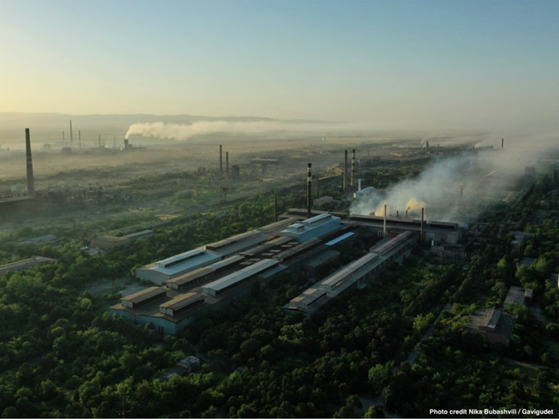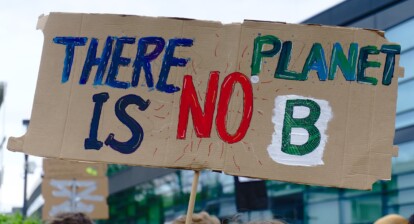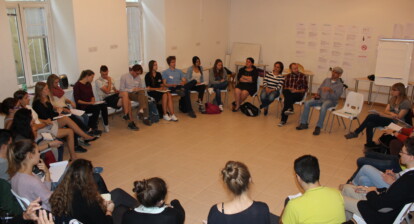“Fridays for future” has become part of students’ weekly routine in some Western European countries. Collins Dictionary even crowned “climate strike” word of the year 2019. But awareness for climate change is less common in South-Eastern Europe. Kyriakos (Greece), Simona (Romania), and Liliana (Bulgaria) have shared insights into the debates on global warming in their home countries. How about the situation in Georgia? Our authors Elene and Rusudan know.
Climate Change in Georgia
Worrying about environmental issues is not new for Georgia – research proves that the temperatures have been rising in the region in the last decades, followed by fires and droughts. According to the EU4Climate article, “Georgia is progressing in the legal approximation process for the environment and climate action under the Association Agreement”, signed in 2016. In a nutshell, this means the legislation concerning the environment and climate action, is progressing. However, there is no way for us to not feel skeptical about it.
Environmental Issues Leading to Death
Rusudan: When we started writing this article, I didn’t know that the title I suggested would be so literal. On August 3, 2023, a tragic event occurred in Shovi, in the Racha region of Georgia. A massive mudslide killed 32 people, including my colleague Sopho, her brother, Giorgi, and their friend, Davit. Living through those days was a nightmare.
It is a brutal, objective truth that climate is changing. This research proves that melting glaciers contributed to this tragedy, but what I find more important is the poor so-called “solution” from the country’s decision-makers. There are beliefs that at least the casualty of this disaster could have been avoided if the state institutions had paid proper attention instead of their negligent behavior, such as dismissing geological characteristics of the place in the infrastructure, and sending the first aid helicopters late due to not having one, overall corrupted system, etc.
Valuable lives were lost, and environmental issues have now become an obvious topic of life and death. This is especially the case in Georgia, where the society expected the government to be investigated for negligence and poor management of natural disasters, but such consequences never occurred.
However, it did not start happening out of the blue. Before the 2023 summer landslide, climate change was prominent through another type of disaster – fires.
Oh, it’s Just Ash
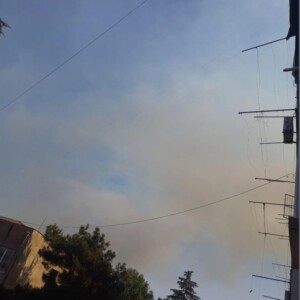
View of ash clouds from my flat in Tbilisi in August 2022 (photo: private).
In summer 2022, news about fires throughout the country were on the daily agenda. “What are those white papers?”, a friend from the seaside asked while strolling by the river in Tbilisi. Used to the ashfall throughout the past weeks, “Oh, it’s just ash”, was my answer. I think besides neglection of individuals (such as leaving glass bottles in the green areas), climate change as such is the overall problem which needs to be solved.
The Reality of Priorities
Researches prove that the necessity to retrieve warm clothes from the depths of our wardrobes slowly fades away, just like the possibility of snow in Tbilisi. However, the big problem is that finding solutions for climate change is not the number 1 priority for us at the moment. Instead, political worries are dominating the society: Currently, 20% of Georgia’s internationally recognized territory is under Russian military occupation, the percentage slowly increasing due to the creeping one: not only creeping, but creepy too. I guess the majority of Georgians would actually love to deal more with climate change instead of worrying about political instability or economic crises.
Civic Engagement: Someone has to act
Regarding the government’s actions against ecological problems, I don’t see a huge difference between countries in South- and Eastern Europe and Georgia: Ecology is not a priority for the upper echelons of power, and active citizens are a minority. However, the unity of the citizens in the Racha tragedy this year was heartbreaking. People volunteered to look for the ones trapped under the rubble, no matter if they were dead or alive. Maybe the need for civic heroes rises when the decision-makers keep failing.
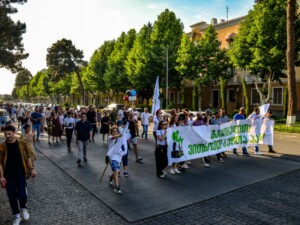
June 2022: protest in Rustavi, Georgia; translation of the inscription on the banner: “We Are Suffocating! We Demand Clean Air!” (photo: Nika Bubashvili / NGO “We Are Suffocating”).
The most active NGOs engaging with the social and ecological issues of the country, are “ჩემი ქალაქი მკლავს“ (“My City is Killing me”) and „გავიგუდეთ“ (“Gavigudet”, literal translation: We Are Suffocating”). The former usually criticizes the government, showcasing the difficulties of everyday life in Georgia, such as the unregulated public transport system, human rights abuse, etc. They inform the residents of the capital about the air quality every day.
Raising Local Voices
”Gavigudet” is the public outcry from Rustavi, the industrial city. It is also the first to come to my mind if I am asked which city suffers the most from environmental issues. The organisation truly relies on volunteers, and it brings me hope to see that the young are the most active ones. They have some achievements worth mentioning, such as being invited to speak in Strasbourg at the Council of Europe in June, 2022. Raising local voices so that the state itself pays attention the community deserves is more important than it seems at first glance.
Smoggy Transitions
After a fiery summer, smoggy autumn is fast to arrive: In 2022, Tbilisi’s traffic congestion became one of the most addressed topics in Georgian media. The fumes are another addition to the city’s climate warming, causing respiratory problems – and not only. People in the industrial city of Rustavi suffer from respiratory problems more – in fact, “We Are Suffocating” has published research which confirms that an increase in new cases of respiratory diseases is correlated with the rise in concentrations of particulate matter – PM2.5 and PM10 in the ambient air in Rustavi.
In 2022, the NGO organized a video contest about air pollution, in which the first prize holder won an air purifier. But, as a resident of Georgia’s capital, I also noticed that avoiding the transport system, made me cough more than usual. Older people seem to have trouble with breathing the most, and the situation does not seem to be changing anytime soon.
Media Coverage: Missing the Bull’s Eye
Media tends to cover what society wishes to hear. As a consequence, the most popular media channels (mostly television), independent on paper, but acknowledged by most Georgians as state-driven, are mostly about politics.
Before the Racha tragedy in 2023, the latest and biggest coverage of climate change topic in Georgia was in 2020, regarding environmental protests against constructing large dam of Namakhvani. And even that was because of the political and economic foul plays, shifting the focus from the core ecological issues…
We Still got Involved!
Actually, we – Rusudan and Elene – met because of climate change. Last summer, we participated in the “Climate Changes As Fast As Fashion” (CCAFAF) Project in Cyprus – an ERASMUS+ youth exchange programme on climate change and circular economy. Fortunately, more and more Georgians are willing to take part in these kinds of project. Even though their main motivation might be to gain international and intercultural experience, there seems to be interest in learning more about important topics that matter to them – such as climate change and the question of how to cope with it as a citizen.
Scoring Achievements
Elene: I attended another international “Law and Environment” Workshop at Marmara University in Turkey a month later. During the assessment of our country’s achievements in ecological aspects, 4-5 and sometimes even 2-3 out of 10 were the numbers you could see me writing (gifting the volunteering sector with 8 points was the only exception). Meanwhile, German participants were evaluating their country with the highest scores.
It is a sad reality that so far, the only positive outcome of participating in such workshops from our side has been educational, such as raising awareness about climate issues and carrying it to the older generation. But can we as individuals do anything practical which really has an impact to stop climate change at all? How to achieve anything as an individual while the global industrial sector doesn’t
Time is Ticking
Honestly, the realization of the fact that climate change combined with corruption and negligence from the global decision-makers has claimed lives, and that environmental problems might have already become irreversible, threw me into a depressive episode. On Cyprus, I could sometimes not hide my anger when I saw the majority, including organizers of the climate change project, caring the most about having fun and paty nights Erasmus+ is famous for.
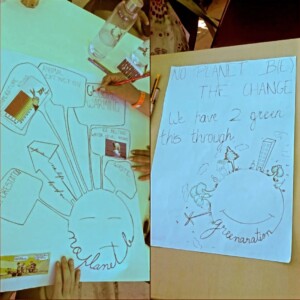
The process of working on our presentations in the CCAFAF Project in Cyprus (photo: private).
My “grudge” was proven during a small-talk with other Georgians. They had studied environmental law at the University of Dundee in Scotland and mentioned their concern, which sounded sadly similar to Kyriakos’s opinion in his article: “Those with the resources to act towards the goal do not care enough about the issue”. Huge amounts are wasted on the international changemakers’ gatherings, on the aesthetic of the halls they will discuss the issue, and expensive diners they will be hosted at, while the earth’s time is ticking.
It reminded me of the meme in which politicians are discussing global warming while the water’s only a wave away to cover their heads. The will to contribute to positive change was the main reason for me to consider pursuing environmental law in the near future.
Climate Change and Education
One of the approaches can be to raise awareness among society. We haven’t learned much about climate change or global warming at schools. We study why it is important to protect the environment. However, just like Simona’s insight about knowledge not being transmitted well enough in Romania, the Georgian society does not have sufficient information about the solutions to climate change – nor are Greta Thunberg’s activities taken seriously. According to the “Fridays for Future” strike statistics, only five strikes took place in Georgia from 2018 to 2022.
Raise Awareness, Not Sea Levels

Our team’s poster “Starter Pack to Stop Climate Change” for the CCAFAF Project in Cyprus (photo: private).
Due to financial issues, NGOs are not able to organize large campaigns, which is why it all comes down to the individuals. Raising society’s awareness about specifics such as fixing cars properly so that they do not emit abnormal amounts of fumes, and not throwing plastics and glasses in the nature and streets might sound to be a common sense. But it a rethink in Georgian society is still necessary.
Laying all Cards on the Table
We are laying our cards on the table by saying that climate change and ecological issues have become prominent problems here: Unfortunately, political instability and a corrupted system are hindering a focus on environmental issues. After all, thinking about ways to decrease carbon dioxide, air- and water-pollution, etc., requires a solution for problems related to security and economics first.

